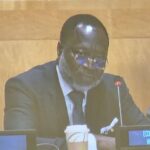CÔTE D’IVOIRE ELECTIONS 2025, ECOWAS DEPLOYS LTOM MISSION.
By Raymond Enoch
In a significant step toward supporting democratic processes and promoting peaceful elections in the West African region, the Economic Community of West African States (ECOWAS) has officially deployed a Long-Term Election Observation Mission (LTOM) to the Republic of Côte d’Ivoire ahead of the country’s highly anticipated presidential elections scheduled for October 25, 2025.
The mission, which was launched on Thursday, October 2, 2025, comprises fifteen (15) seasoned electoral experts drawn from various ECOWAS member states. These observers, who arrived in the Ivorian economic capital of Abidjan, are tasked with monitoring the electoral process over a period of nearly four weeks. They are expected to remain in the country until October 29, 2025, two days after the elections, to assess the post-electoral environment and the final stages of the electoral process.
The deployment of the LTOM was sanctioned by the President of the ECOWAS Commission, His Excellency Dr. Omar Alieu Touray, and is grounded in a robust legal framework that underpins the regional body’s commitment to democratic governance and peace. This includes key legal instruments such as the 1993 Revised ECOWAS Treaty, the 1999 Mechanism for Conflict Prevention, Management, Resolution, Peace and Security, the 2001 Additional Protocol on Democracy and Good Governance, and Article 53(c) of the ECOWAS Conflict Prevention Framework adopted in 2008.
According to ECOWAS, the long-term observers will focus on various critical aspects of the electoral process, including the legal and political context, the performance of electoral institutions, voter registration, campaigning activities, the media environment, and potential conflict triggers. Their presence is aimed at fostering transparency and public confidence in the election, which is widely viewed as a test of Côte d’Ivoire’s democratic consolidation following a history of electoral tensions.
The ECOWAS LTOM initiative reflects the regional bloc’s broader strategy to prevent electoral violence and ensure stability in West Africa, a region that has witnessed a complex mix of democratic gains and setbacks in recent years. With Côte d’Ivoire emerging from a turbulent political past marked by disputed elections and political unrest, the 2025 polls are considered critical in shaping the country’s democratic trajectory.
While the identity of the fifteen deployed experts has not been officially disclosed, they are understood to be individuals with considerable expertise in electoral law, media monitoring, political analysis, and conflict resolution. Their findings and recommendations will feed into ECOWAS’s final electoral report, which is expected to influence both regional diplomacy and international perspectives on the Ivorian electoral process.
The long-term mission will later be reinforced by a Short-Term Observation Mission (STOM) composed of additional ECOWAS personnel, including members of the ECOWAS Council of the Wise, members of parliament from the ECOWAS Parliament, and officials from the ECOWAS Commission. These short-term observers will be deployed closer to election day to support broader field coverage and provide a more immediate assessment of polling, vote counting, and collation processes.
The ECOWAS Commission reiterates its unwavering commitment to peace, democracy, and credible elections across the region, urging all Ivorian stakeholders — including political parties, civil society organizations, and the general populace — to engage in the process peacefully and responsibly.
As Côte d’Ivoire inches toward a decisive electoral moment, the presence of the ECOWAS LTOM stands as a visible reminder of the importance of regional solidarity and the collective responsibility to safeguard democratic integrity in West Africa.










